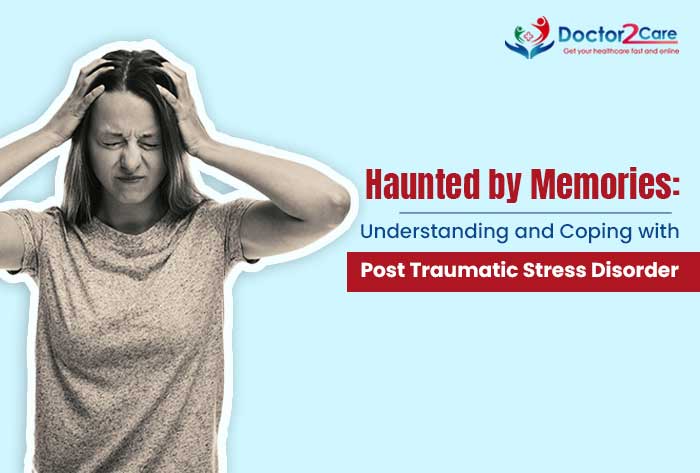Haunted by Memories: Understanding and Coping with Post Traumatic Stress Disorder

Mental health illness refers to a wide range of conditions that affect a person's thinking, normal behaviour, and daily mood. These conditions can cause significant change in lifestyle leading to distress and impairment in a person's daily routine, including their ability to work, socialise, and maintain relationships.
Mental health illnesses can appear in many different forms, such as depression, anxiety disorders, bipolar disorder, schizophrenia, and post-traumatic stress disorder (PTSD). Each condition has its own set of symptoms and treatment options. The severity of symptoms can vary widely from person to person.
Despite the prevalence of mental health illnesses, there is still a significant stigma attached to them. Many people feel ashamed or embarrassed to talk about it and seek help, and as a result, they may suffer in silence for years before seeking treatment. They can start by seeking help via an online doctor consultation in India if they cannot be physically present.
This blog gives an overview of post traumatic stress disorder.
What is Post Traumatic Stress Disorder?
Post Traumatic Stress Disorder is a psychiatric condition that shows up in people who have had a tough past or have witnessed a traumatic event, series of events or some circumstance that was difficult to handle.
Individuals may experience this as an emotionally draining and physically harmful or life threatening situation where their mental, physical and social life and spiritual well being is affected.
People suffering from PTSD have intense flashes of disturbing thoughts and feelings related to their experience that lasts for long after the traumatic event has happened. They may go through the event through flashbacks or nightmares, which may make them feel sadness, fear or anger; or they may feel detached or estranged from reality.
People with PTSD may avoid situations or people that remind them of traumatic events, and they may have strong negative reactions to something as ordinary as a loud noise or an accidental touch.
Events that can lead to PTSD
PTSD develops after a very stressful, frightening or grieving event, or after a prolonged traumatic experience hence the name.
The types of events that can lead to PTSD are.
- Serious accidents
- Physical or sexual assault
- Abuse, including childhood or domestic abuse
- Exposure to traumatic events at work, including remote exposure
- Serious health problems, such as being admitted to intensive care and excessive usage of medicines and injections.
- Childbirth experiences, such as losing a baby
- The death of someone close to you
- War and conflict
- Torture and bullying
- Murder or life threatening event
Symptoms of PTSD
The symptoms of PTSD can vary in severity and can last for months or years after the traumatic event. The following are some common symptoms of PTSD:
- Re-experiencing symptoms: This can include intrusive memories, flashbacks, nightmares, or strong emotional reactions to reminders of the traumatic event.
- Avoidance symptoms: This can include avoiding places, people, or things that are reminders of the trauma. A person with PTSD may also avoid talking about the trauma or their feelings related to it.
- Hyperarousal symptoms: This can include being easily startled, feeling tense or on edge, having difficulty sleeping or concentrating, and engaging in reckless or self-destructive behaviour.
- Negative changes in mood or cognition: This can include negative thoughts or feelings about oneself or others, feelings of detachment or estrangement from others, and an inability to experience positive emotions.

Diagnosis of PTSD
The following are some key aspects of the diagnostic process for PTSD:
- Evaluation of symptoms: A mental health professional will ask about the person's symptoms, including re-experiencing symptoms, avoidance symptoms, hyperarousal symptoms, and negative changes in mood or cognition. They will also inquire about the nature and duration of the traumatic event or events that led to the symptoms
- Differential diagnosis: The mental health professional will also consider other possible diagnoses that could explain the person's symptoms, such as other anxiety disorders or mood disorders.
Treatment and cure of PTSD
Post-traumatic stress disorder treatment helps patients regain a sense of control over their life. There are two type so treatment:
Psychotherapy: There are two types of psychotherapy.
- Cognitive Therapy : It is the talk therapy that lets one talk about the event.
- Exposure Therapy : This is behavioural therapy where the person is given a similar kind of situation to cope up with the prior fear.
Medication: Medicines that help to keep PTSD under control are:
- Antidepressants: These medicines help with the symptoms of depressions.
- Prazosin: These help may reduce and suppress nightmares in some people with PTSD.

Wrapping Up
PTSD is a complex disorder, and there is no one-size-fits-all approach to treatment. However if you can relate to any of the symptoms above mentioned or going through a bad phase in life then you can simply book your first doctor session via portals that give online doctor consultation in India.